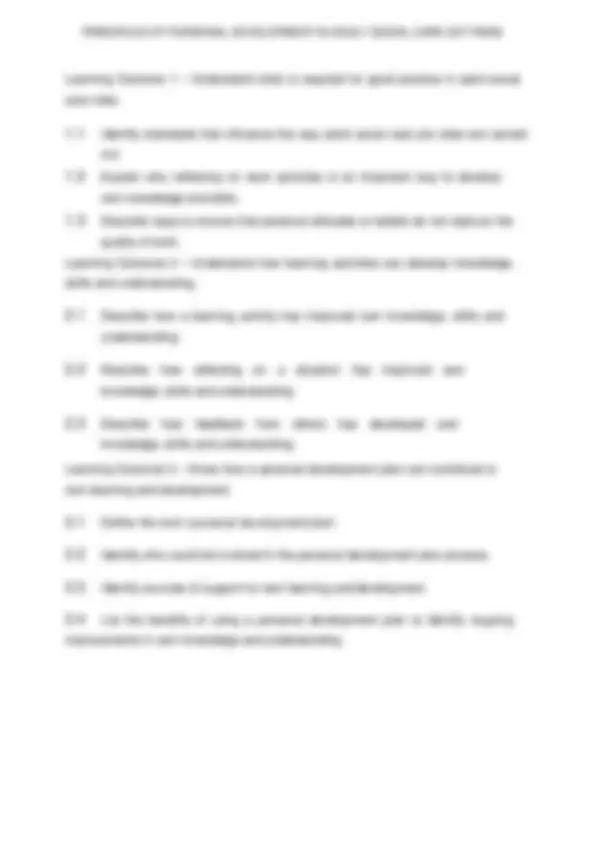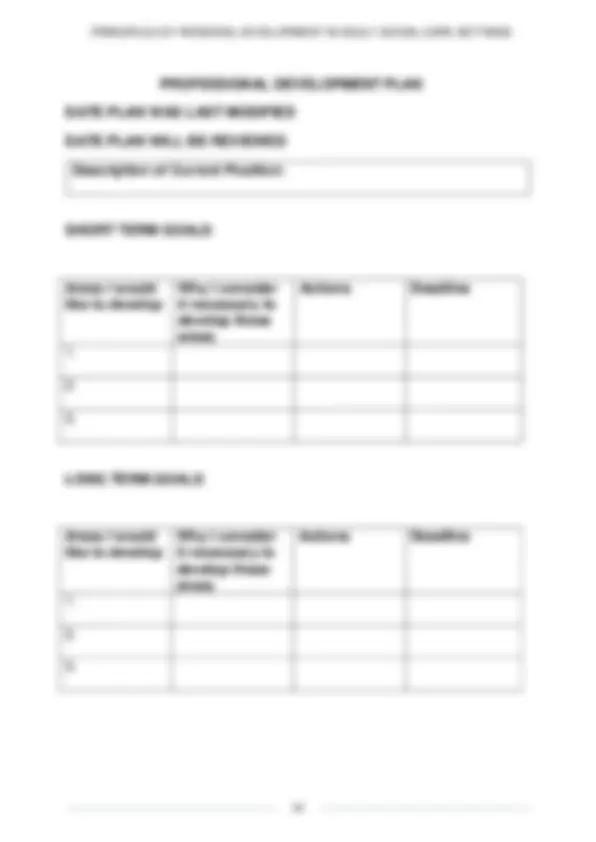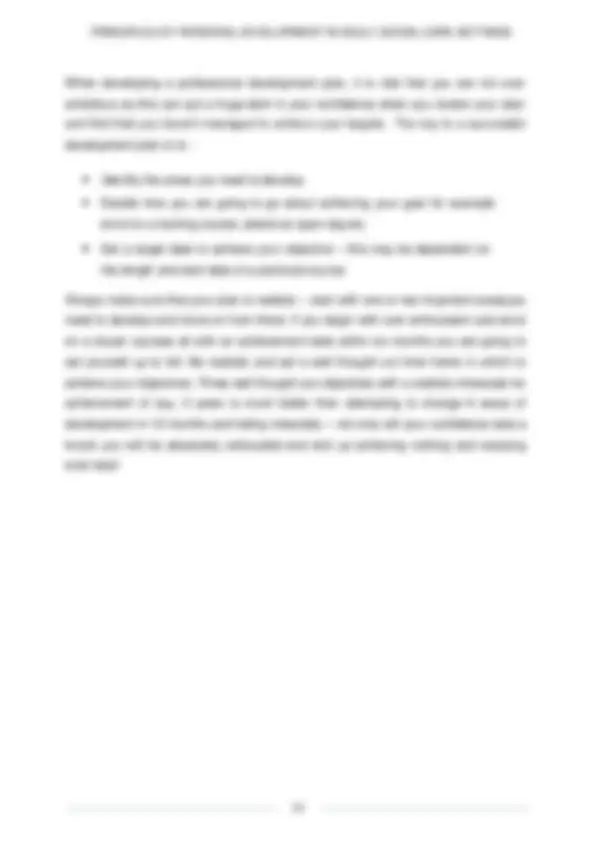










Study with the several resources on Docsity

Earn points by helping other students or get them with a premium plan


Prepare for your exams
Study with the several resources on Docsity

Earn points to download
Earn points by helping other students or get them with a premium plan
Community
Ask the community for help and clear up your study doubts
Discover the best universities in your country according to Docsity users
Free resources
Download our free guides on studying techniques, anxiety management strategies, and thesis advice from Docsity tutors
The principles of personal development in adult social care settings, focusing on understanding standards, reflection, and personal development plans. It covers topics such as identifying standards that influence adult social care job roles, reflecting on work activities, and creating personal development plans. The document emphasizes the importance of good practice, continuous learning, and avoiding bias in assessment.
What you will learn
Typology: Lecture notes
1 / 14

This page cannot be seen from the preview
Don't miss anything!









3
What do we mean when we talk about ‘good practice?’ Good practice is about knowing your job role well and performing your duties in line with your job role consistently and professionally. You have a ‘duty of care’ which means that as a carer you are responsible for the safeguarding of the individuals you are trusted to care for and to support their needs at all times. In order to do this you need to be competent and knowledgeable. There are a number of ways you can gain knowledge and competence the most obvious being through the attendance of training courses. In addition you may also:
4
There are certain standards that must be adhered to when working in adult social care and it is important that you are aware of, and understand, these standards. Codes of Practice – The Care Quality Commission (CQC) is the regulatory body for health and social care and they carry out inspections of the work place using set standards to monitor and assess performance.
6
It is important when working in the care sector that you take the time to self-assess and to reflect on the work that you do. Looking carefully at the way you work and how you relate to those around you will help you to see what you do well and work on the areas which require improvement. By critically analysing your work practice you will be able to reflect on the good areas of practice and change the areas which require improvement. The process of reflection should not just be something you do at work. It is the tool for everyone as they go through life learning.
Decide what went well and what didn't
The process of reflection should look something like the diagram above. You begin with a starting point – something which has happened – this might be something positive or it may begin with a problem. Once the starting point has been identified it will be followed by something that you do. Your actions will depend on your starting point. If for example you have a problem to deal with, your actions may be to report the incident to your supervisor. Once you have dealt with the matter in hand you need to consider the outcome and decide whether what you did was beneficial and solved the problem or whether matters were made worse. Finally, once you have reflected on the outcome you need to decide upon changes to be made, if any changes, should be made to make the situation easier in future or, in the event of a problem, to avoid it completely. Self-reflection requires honest, unbiased self-criticism and can often be very difficult. It can be easier to talk to a colleague when carrying out self-reflection and ask for their honest opinion. Reflect on outcome Star-ng Point Make any necessary changes Ac-ons done by you
By failing to reflect on your work practice and to think about what you do and how you do it you are at risk of never moving forward or improving your skills. Sometimes the cause for reflection will be impossible to ignore as it may come directly from the individuals you are caring for in the form of praise or criticism. If you are being praised, then you need to reflect on this in the same way as you would reflect on a complaint. Whilst we all enjoy being praised it is important to understand what is being appreciated and why, in order that we can continue to provide a good service. Equally, if someone criticizes the care they have received it is vital that we find out why the individual has cause to complain and what we can do to put things right and ensure that they never happen again.
Ideally every professional person should have a personal development plan as this helps us to reflect on and develop skills for the future. Personal development plans should be encouraged by your manager who will be able to support and advise you. Often supervisions or appraisal meetings are the time for discussing personal development plans as this is when any problems, areas of improvement and gaps in training might be identified. It is important to remember that honesty is the best policy when attending supervision and appraisal meetings as without the ability to be honest nothing will be achieved. No-one likes to be told that they are not performing as well as might be expected however it would be a poor manager who did not bring any concerns to the attention of their employees as improvements can only come about once issues have been identified, discussed and addressed. It is a good idea, prior to an appraisal or supervision meeting, to reflect on your performance. Think about what you consider to be your best attributes and strongest assets and then think about which areas you would like to improve – no-one knows everything, and we can all improve in some areas. You might like additional training on a certain area of your job for example the administering of medication or personal care, and this should be noted so that it can be discussed with your manager and added to your personal development plan. Although the usual formal qualifications in health and social care are usually gained at levels 2 and 3 there are a number of other options available to assist you in personal development for example specific areas of training which can be done online. In addition to your manager you can also get support from any tutors you are in contact with whilst carrying out additional training. They will be able to advise you with regard to your personal development plan and help guide you in your choice of study. Online forums, assessors and work colleagues can all prove invaluable when it comes to seeking support for your own learning and development.
When developing a professional development plan, it is vital that you are not over ambitious as this can put a huge dent in your confidence when you review your plan and find that you haven’t managed to achieve your targets. The key to a successful development plan is to: -